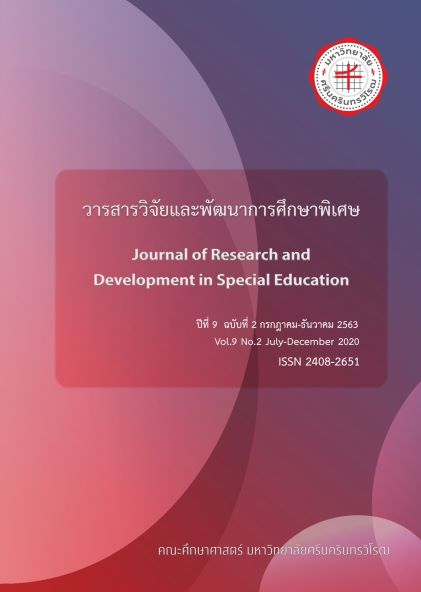รูปแบบและแนวทางการพัฒนาการจัดการศึกษาสำหรับเด็กที่มีความต้องการพิเศษ โดยการมีส่วนร่วมของชุมชน
Abstract
บทคัดย่อ งานวิจัยนี้มีวัตถุประสงค์เพื่อสังเคราะห์รูปแบบการจัดการศึกษา สำหรับเด็กที่มีความต้องการพิเศษโดยการมีส่วนร่วมของชุมชน และเสนอแนวทางการพัฒนาการจัดการศึกษาสำหรับเด็กที่มีความต้องการพิเศษโดยการมีส่วนร่วมของชุมชน เป็นการวิจัยเชิงคุณภาพ ดำเนินการลงพื้นที่ถอดบทเรียนในสถานศึกษาที่มีความเข้มแข็งด้านการจัดการศึกษาสำหรับเด็กที่มีความต้องการพิเศษโดยการมีส่วนร่วมของชุมชน 3 แห่ง ครอบคลุมระดับการศึกษา 3 ระดับ ได้แก่ ระดับปฐมวัย ระดับการศึกษาขั้นพื้นฐาน และระดับอาชีวศึกษา เก็บข้อมูลด้วยวิธีการศึกษาเอกสารของกรณีตัวอย่างที่ดีที่ได้รับการคัดเลือก การสัมภาษณ์เชิงลึก และการสนทนากลุ่ม กลุ่มผู้ให้ข้อมูลสำคัญ รวมทั้งสิ้น 18 คน จำนวน 6 คนต่อแห่ง ได้แก่ ผู้บริหารโรงเรียน/ผู้อำนวยการกองการศึกษา ครูหัวหน้าฝ่ายวิชาการ ครูผู้สอน กรรมการสถานศึกษา ผู้ปกครอง และผู้นำชุมชน จากนั้นวิเคราะห์และสังเคราะห์รูปแบบจากบทเรียน 3 แห่ง จัดทำแนวทางจากผลการวิเคราะห์ปัญหาและข้อเสนอแนะจากการถอดบทเรียน และประเมินรูปแบบและแนวทางโดยผู้ทรงคุณวุฒิที่มีประสบการณ์เกี่ยวข้องกับการจัดการศึกษาสำหรับเด็กที่มีความต้องการพิเศษ จำนวน 6 คน ด้วยการสัมมนาอิงผู้เชี่ยวชาญ วิเคราะห์ข้อมูลด้วยการวิเคราะห์เนื้อหาและการสรุปประเด็น ผลการวิจัย พบว่า 1) รูปแบบการจัดการศึกษาสำหรับเด็กที่มีความต้องการพิเศษโดยการมีส่วนร่วมของชุมชนที่ผ่านการสังเคราะห์ มีแนวคิดมุ่งสร้างโอกาสทางการศึกษาและอาชีพให้แก่เด็กที่มีความต้องการพิเศษ โดยวิธีการ 5 ขั้นตอนใหญ่ๆ ประกอบด้วย 1) การระบุปัญหาและหาทางแก้ 2) การวางแผนปรับหลักสูตร กิจกรรม และทรัพยากร 3) การจัดสรรงบประมาณและการสื่อสาร 4) การติดตามประเมินผลนักเรียน และ 5) การร่วมรับประโยชน์ทางตรงและทางอ้อมเพื่อนำไปสู่การส่งต่อเด็กไปยังสถานศึกษาในระดับที่สูงขึ้นหรือเส้นทางการทำงานประกอบอาชีพ โดยการดำเนินงานประกอบด้วยหน่วยงาน/องค์กร 7 องค์ประกอบ ที่มีบทบาทร่วมกันได้แก่ สถานศึกษา ชุมชน หน่วยงานท้องถิ่น วัด หน่วยงานด้านสาธารณสุข มหาวิทยาลัย/ศูนย์การศึกษาพิเศษ และสถานประกอบการ 2) แนวทางในการพัฒนาการจัดการศึกษาสำหรับเด็กที่มีความต้องการพิเศษโดยการมีส่วนร่วมของชุมชน ประกอบด้วย 2 ส่วน ได้แก่ แนวทางในการเสริมสร้างความเข้มแข็งภายในสถานศึกษา และแนวทางเสริมสร้างความเข้มแข็งของเครือข่ายการมีส่วนร่วม คำสำคัญ: รูปแบบการจัดการศึกษา, เด็กที่มีความต้องการพิเศษ, การมีส่วนร่วมของชุมชน ABSTRACT This research aimed to synthesize models and to propose development guidelines of educational provision for students with special needs with community participation. The research employed qualitative method. The lesson learned of 3 purposively selected schools which are best practices of educational provision for students with special needs with community participation, covering 3 educational levels: early childhood, basic, and vocational, were employed. Data were collected by documentary study, in-depth interview, and focus group. Key informants included 18 people, 6 per each school, of school principals or administrators, teachers who are heads of academic affair, teachers who teach students with special needs, school committee members, parents, and community leaders. Then the models were analyzed and synthesized from 3 lesson learned the development guidelines were developed using the information of problems and suggestion results from the lesson learned. The models and development guidelines were reviewed by 6 experts in special education using connoisseurship. Data were analyzed using content and thematic analyses. The results found that 1) The model of educational provision for students with special needs with community participation synthesized from the 3 selected lesson learned aims to provide educational and career opportunity for students. There are 5 major implementation steps, including 1) problem identification and solution finding, 2) curriculum, activity, and resource preparation, 3) budgeting and communication, 4) student monitoring and assessment, and 5) sharing of direct and indirect benefits, for advancing students to higher educational level or employment. The implementation of educational provision involves 6 organizations comprising of school, community, local administrative organization, temple, public health organization, university/special education center, and establishment. 2) Development guidelines of educational provision for students with special needs with community participation consists of 2 components including 1) internal school strengthening, and 2) community participation network strengthening. Keywords: Model of Educational Provision, Students with Special Needs, Community ParticipationDownloads
Download data is not yet available.
Downloads
Published
2021-01-16
Issue
Section
Research article




